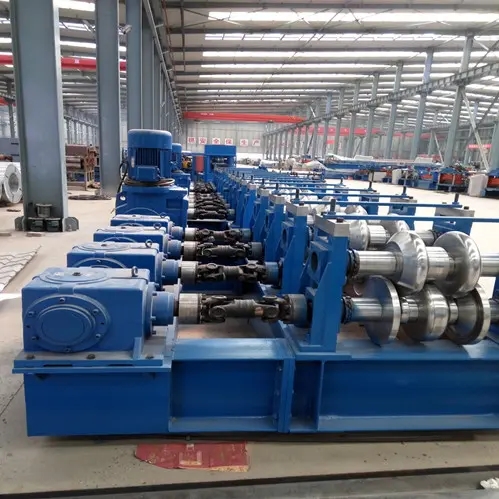
The Role and Benefits of Automatic Round Downspout Roll Forming Machines
In the ever-evolving world of manufacturing, the demand for precision, efficiency, and automation has led to the widespread adoption of specialized machinery. Among these innovations, the automatic round downspout roll forming machine stands out as a crucial piece of equipment, particularly in the construction and roofing industries. This article explores the functionality, benefits, and significance of these machines in modern manufacturing processes.
Understanding Downspouts
Before delving into the machinery itself, it is essential to understand what downspouts are. Downspouts are vertical pipes that channel rainwater from a roof gutter to the ground or a drainage system, preventing water damage to buildings. Round downspouts, characterized by their circular cross-section, provide excellent flow characteristics and are commonly used in residential and commercial constructions.
The Functionality of Automatic Round Downspout Roll Forming Machines
An automatic round downspout roll forming machine is designed to convert flat metal coils into perfectly shaped round downspouts. The process involves several steps, including feeding the metal coil, shaping it into the desired round form, and cutting it to the required length. The automation aspect refers to the machine's ability to perform these tasks with minimal human intervention, which significantly enhances productivity.
The roll forming process takes place in multiple stations, where the metal strip is gradually shaped into a round profile through a series of rollers. These machines are equipped with advanced controls and sensors to ensure consistent quality and precision in production. Once the metal reaches the final shape, it is cut to the specified length and prepared for installation.
Benefits of Using Automatic Round Downspout Roll Forming Machines
1. Efficiency and Speed One of the most significant advantages of automatic roll forming machines is their efficiency. These machines can produce a high volume of round downspouts in a relatively short amount of time, thereby meeting the demands of large-scale construction projects.

2. Consistency and Quality Automated systems ensure that each downspout is produced to the same specifications, eliminating variations and defects that might occur with manual processes. This consistency not only improves the overall quality of the product but also reduces waste and rework.
3. Cost-Effectiveness By automating the production process, companies can reduce labor costs and increase output simultaneously. The ability to produce downspouts at a lower cost makes them more competitive in the market, providing better pricing for consumers.
4. Flexibility and Customization Many modern roll forming machines offer the capability to customize the size and shape of downspouts according to specific project requirements. This flexibility is particularly beneficial in projects where unique design elements are needed.
5. Ease of Operation With user-friendly interfaces and automated controls, operating these machines does not require extensive training or expertise. This aspect allows companies to focus their workforce on other important areas of production and design.
6. Durability and Longevity Automatic roll forming machines are built to withstand the rigors of continuous operation. With proper maintenance, these machines can deliver reliable performance for many years, making them a sound investment for manufacturers.
Conclusion
The automatic round downspout roll forming machine represents a significant advancement in the manufacturing of essential architectural components. By combining efficiency, quality, and customization capabilities, these machines address the growing demands of the construction industry while ensuring that products meet high standards. As technology continues to evolve, the role of such automated machinery will undoubtedly expand, paving the way for a more efficient and innovative manufacturing landscape.
Investing in an automatic round downspout roll forming machine can prove to be a transformative decision for manufacturers, enhancing their production capabilities and positioning them as leaders in the competitive construction market.